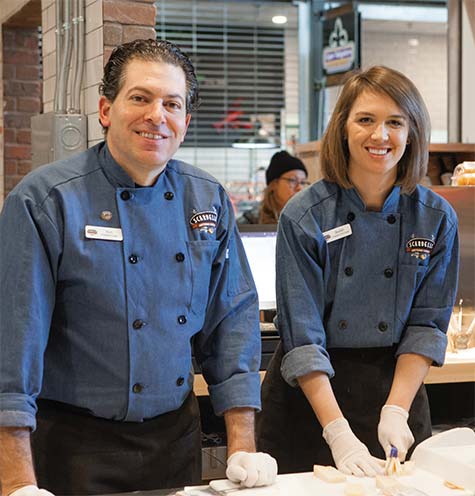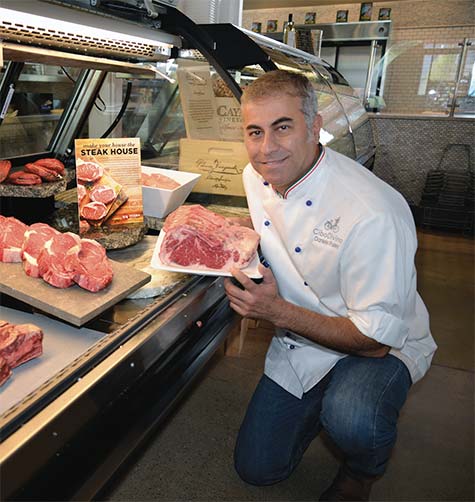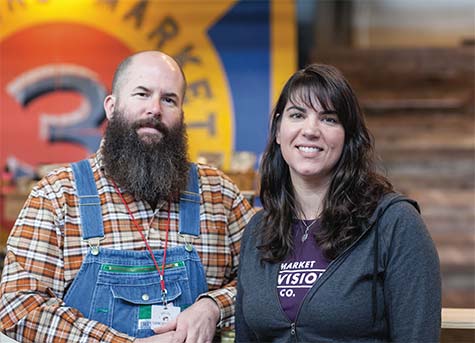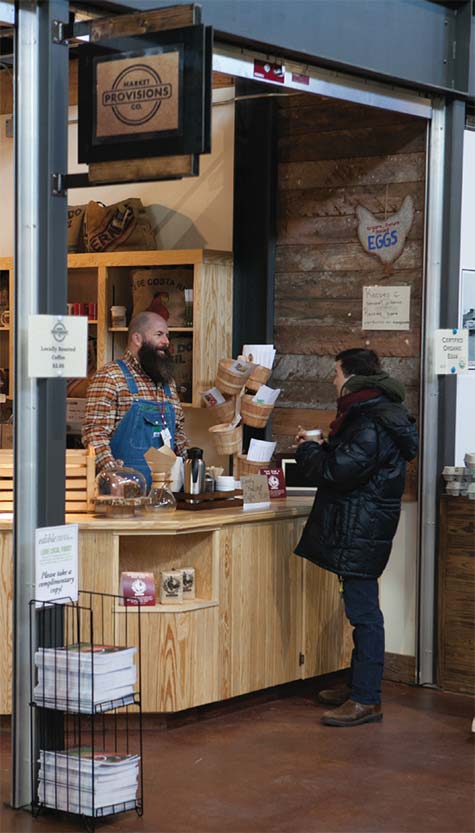SAY CHEESE
By Terri Taylor • Photo by Kelly Yandell
 Rich Rogers, owner, and Austin Dupree, manager, Scardello Farmers Market
Rich Rogers, owner, and Austin Dupree, manager, Scardello Farmers Market
“Our cheese and charcuterie selection at the
market is almost entirely domestic, including
a wider selection of Texas cheeses.”
— Rich Rogers
Weekdays are beginning to buzz at the Dallas Farmers Market as downtowners, tourists and the lunch-bunch discover the growing list of local food purveyors whose doors open daily. The enclosed retail space, simply called The Market, sits adjacent to the open-air Shed where growers and craftsmen gather on weekends to sell local food and wares.
Among the new Market proprietors is Rich Rogers of Scardello Artisan Cheese, who was eager to be a part of what he saw as an emerging and vibrant scene. “We’ve been excited about all of the new development in downtown Dallas,” says Rogers. “Add that to the fact that we’ve always enjoyed working with local cheesemakers. It seemed like a great opportunity.”
For over seven years, Rogers and his crew have been slinging cheese and educating their consumers through often sold-out tastings and classes at the popular Scardello Oak Lawn. They offer over 150 cut-to-order small production cheeses, plus the accompaniments: artisanal bread, spreads, charcuterie, wine and beer.
“About 45% of the case at Oak Lawn is European,” says Rogers. “We’ve always celebrated American cheesemakers, but being at the farmers market allows us to devote even more energy on cheese made here. Our cheese and charcuterie selection at the market is almost entirely domestic, including a wider selection of Texas cheeses.”
The manager at Scardello Farmers Market is Austin Dupree who worked at the Oak Lawn store in its early days. “I’m thrilled to come back to help open and shape our new location,” says Dupree. “We’ll continue to strive to support small traditional producers, focus on real food and celebrate delicious cheese.”
Included in their Texas producers are Caprino Royale, Eagle Mountain Cheese, Haute Goat, Latte Da Dairy, Mozzarella Company and Veldhuizen Family Farm. The neatly designed 400-square-foot store features an antique red brick façade with salvaged wood and a backdrop of white subway tiles. A center butcher block is surrounded by cold cases, a shelved alcove and a sit-down bar where customers can enjoy cheese plates, charcuterie, salads or sandwiches. There are two Martin House beers—Cellerman’s Reserve IPA and Bockslider—and domestic wine on tap.
Watch for announcements about educational get-togethers similar to their Oak Lawn location. “At the market,” says Rogers, “we plan to have regular, but less formal classes and tastings in the coming months.” Scardello Farmers Market is open 10 a.m. to 6 p.m., daily. scardellocheese.com
The Dallas Farmers Market is located at 1010 S. Pearl Expressway.
dallasfarmersmarket.org
44 FARMS BEEF AT CIBODIVINO
 Daniele Puleo, owner of CibodiVino
Daniele Puleo, owner of CibodiVino
“The beef bacon has been flying out of
here,” says Olmos. “The tenderloin sells
like crazy.”
In four years, 44 Farms has become the go-to brand for boutique Texas steaks, gracing picky chefs’ menus from John Tesar’s at Knife to David Uygur’s at Lucia. (My eye-opening 44 Farms experience was with Knife’s inexpensive, melt-in-mouth coulotte.)
Last year, Dallas’ CiboDivino—owned by former restaurateur Daniele Puleo and wife Christina—became the only retail outlet in North Texas for 44 Farms’ registered Angus beef. Getting the placement was no slam dunk.
“They (44 Farms) were very reserved,” says CiboDivino executive chef and managing partner Ryan Olmos. CiboDivino approached them about retail after Olmos’ visit to the Cameron ranch last summer. He came away sure that they were a match for the Sylvan Thirty Italian marketplace, which is meticulous about humane and sustainable sourcing, although this isn’t heavily publicized.
44 Farms owner and CEO Bob McClaren’s family has been in ranching since the early 1900s. Steaks are a spinoff of its primary business as a genetics developer, which is the foundation for the beef’s quality. The other crucial factor: animal-centered care, birth to harvest.
“Everything we do is to cause the least amount of stress on the cattle as possible,” says McClaren. For example, they’re weaned at seven months over three days. “They’re weaned across a fence,” he says. “They can still see and lick and touch (their moms), just not nurse. By day three, the mothers have moved on.” When the cattle transition to feed yards, McClaren says, they’re kept in small pens, where the gates are always open to pasture.
“We saw the cattle and how they were cared for,” says Olmos. “The cattle walked up to me. I petted them. They were happy animals.” Besides 44 Farms’ “immaculate” operation, he was impressed by the staff cohesion. Plus, the ranch is open anytime to anyone who cares to visit.
McClaren went all in with CiboDivino once they checked out on his end. He was even on hand to help when they unveiled the meat case. “A lot of people don’t understand how to select a steak,” he says, but that’s not the case with CiboDivino. “They were experienced beef people.”
Sales at CiboDivino underscore the triple win for rancher, retailer and consumer. “The beef bacon has been flying out of here,” says Olmos. “The tenderloin sells like crazy.” Olmos makes the bacon in-house, sometimes adding porcini mushrooms and jalapeños. He also grinds his own beef. You can take the steaks home, or the chef or Puleo will cook them for you for on-site consumption, no charge. “We absolutely love being the fi rst (retail) partner,” Olmos says.
cibodivinomkt.com
44steaks.com
MARKET PROVISIONS CO.
Retail Store for a Regional Hub
By Terri Taylor • Photos by Kelly Yandell
 Chad Julka, Farm Programs Director, and Susie Marshall,
Chad Julka, Farm Programs Director, and Susie Marshall,
Executive Director, Grow North Texas

“We can put a name and face to every product here,” says Market Provisions’ Chad Julka, pointing to shelves and racks filled with all things local. Located at the Dallas Farmers Market in The Market building, the shop is part farm stand, part general store.
There are bushel baskets of fresh produce, loaves of D’s Sourdough, eggs from Raney Farms’ pastured hens, roasted coffee beans from Noble Coyote and Full City Rooster, Cowgirl Whey chevre and Texas Honeybee Guild honey. Judi Glasgow of JuHa Ranch is delivering a cooler of meat orders on the day I visit.
“As ranchers, we can’t be at the market every day,” says Glasgow.
“But JuHa’s products can be ordered on our website and picked up at Market Provisions seven days a week. How easy is that?”
Customers will also be happy to know that the store’s proceeds go to fund acceptance of food access programs like SNAP (food stamps) at the DFM.
But that’s only half the story. Behind the retail shelves, the store is also home to a sister enterprise, Genuine Provisions, which has an online site devoted to helping small-scale regional growers find additional avenues for doing business.
Thanks in part to a recent USDA (Local Food Promotion Program) grant, a web marketing platform is being developed and implemented under the auspices of the non-profi t GROW North Texas. According to GNTX Executive Director Susie Marshall, her organization is dedicated to creating a healthy regional food system that encourages economic opportunity, enriches the land and gives all North Texans equitable access to nutritious foods.
To further this goal, the USDA grant is being used to connect smallscale growers with the community in ways that extend past the farmers market.
“What we’re doing behind the scenes is rebuilding agriculture in the middle,” says Marshall. “It’s part of something that’s happening around the country. An exciting movement.”
Farmers and ranchers oft en lack the time and expertise to market their goods to a wider audience. At genuineprovisions.org, growers are able to connect with prospective wholesale buyers, like chefs and other commercial users, who can track what’s being harvested each week. As a first step, prospective buyers and producers create an online profile, after which the Genuine Provisions staff follows up with a call to hone in on their needs and products.
“We’ve scouted other regions to see what works best,” says Julka, who serves as Farm Programs Director.
One of the most obvious signs of progress is a 20-foot insulated shipping container sitting at the edge of The Shed. “We’re getting creative with space,” laughs Julka. The refrigerated container has a keyless code entry where producers can drop off goods at night for a restaurant to pick up the next morning. Plans include a larger storage facility and trucks for delivery.
“We’re looking for [wholesale customers] who are truly committed to regional agriculture,” says Julka. “We already have the support of local food champions like Mark Wootton [Garden Café], Chad Houser [Café Momentum], Matt McCallister [FT 33 and Filament] and Misti Norris [Small Brewpub].”
They also have DFM neighbors who are customers.
“I might walk down to Joanne [Bondy] at Stocks & Bondy or Suki [Otsuki] at Mudhen with 10 pounds of something—extra turnips or radishes,” says Julka. “And they can use it in a daily special. This produce is as fresh as it gets.”
Potential buyers might also include hospitals, buying clubs or larger multi-site restaurants with an eye on local.
“My approach with a producer,” says Julka, “is that they should always have a presence at a farmers market, but we want to give them more avenues for their surplus. Everything being done here is to bring revenue to our local growers.”
Market Provisions is open daily at The Market at the Dallas Farmers Market from 10 a.m.–6 p.m. You can also find them in The Shed on Saturdays from 8 a.m.–5 p.m and Sundays from 10 a.m.–5 p.m.
marketprovisions.org
genuineprovisions.com
grownorthtexas.org
FARFA: FIGHTING FOR
SMALL FARMS AND RANCHES
by Pamela Walker

Reforming farm-and-food policy isn’t everyone’s cup of kombucha. In fact, most people find policy work downright unappetizing, much as they do sausage making, to which the legislative process is proverbially compared. But if we like our local kombucha and sausages and want local food production to grow, we must press for policy and regulatory reform beneficial to independent family farmers and their customers. Fortunately, we have Judith McGeary, founder and executive director of the Farm and Ranch Freedom Alliance (FARFA), doing much of the dirty work and opening ways for us to provide effective support. Joining FARFA is a good place to start.
Judith, a central Texas rancher with a biology degree from Stanford and a law degree from the University of Texas, has made FARFA a real force in influencing policy and regulations at the state and national levels. From 2006–2010, FARFA led a national coalition to stop the USDA from implementing a National Animal Identification System (NAIS), which would have required owners of even a single livestock or poultry animal to register their property, digitally tag each animal and report animal movements to the USDA. NAIS would have been costly for small meat, dairy, and egg producers and forced many out of business, affecting thousands of customers of local animal products.
FARFA also helped lead the fight to amend the 2010 Food Safety Modernization Act in order to protect small-scale farmers with local markets from potentially crushing federal regulations designed for large conventional producers. FARFA continues to monitor the thicket of Food and Drug Administration (FDA) regulations related to this act, and during the 2015 Texas legislative session helped pass a bill requiring the Texas Department of State Health Services to post on its website any cooperative agreements with the FDA regarding the food safety act and to solicit public comments and respond to them. This bill gives Texas producers and their customers a view of the regulatory process and a say in it that we otherwise would not have.
Another 2015 legislative success was defeating a bill that would have funded a study for a statewide water marketing and conveyance grid, facilitating water transfers from rural to urban areas without regard to conservation or impacts on rural communities and farmers. Additional achievements were a bill to make more land available for community gardens, by limiting the liability of garden plot owners, and one to help promote on-farm educational and recreational activities, by limiting the liability of farmers who take certain precautions.
Another victory is a bill helping beekeepers and their honey customers by exempting beekeepers managing their own hives from having to have a commercial kitchen, an expensive facility, and allowing them to sell up to 2500 pounds of honey from home and at farmers markets and public festivals. This bill builds on FARFA’s success with a 2013 bill making it easier for producers of prepared foods—sometimes called cottage foods—to market a wider range of products from home and at farmers markets, exempting those selling under $50,000 annually from the requirement of a commercial kitchen.
Most people want genetically engineered (GE) foods labeled, and FARFA works on labeling issues and on stopping federal approval of more GE crops and foods. And because many people prefer raw milk to pasteurized, FARFA advocates legislation to allow licensed dairy farmers to sell at farmers markets and to deliver their milk to customers, instead of requiring customers to travel to farms for milk, the current Texas law. In the 2015 session, raw milk reforms received strong bipartisan support for the first time yet failed passage.
So did a bill that would have provided small farmers, including urban ones, greater opportunity to qualify for the agricultural property tax valuations available to large-scale farmers. Nonetheless, the momentum for change is growing, and Judith has hope for the 2017 session.
FARFA’s scope and effectiveness are most visible at its annual Farm and Food Leadership Conference and during the biennial meeting of the Texas Legislature. The conference draws people from throughout Texas and the nation and includes training by professional lobbyists and legislative staff in the tactics of citizen activism.
Judith herself offers tactical workshops in the Texas capitol when committee hearings on farm and food bills take place, and FARFA members from various areas of Texas come to visit with legislators in person. She also calls for action throughout the year with newsletters and email and Facebook alerts that analyze the issues and include guides on how best to communicate with elected officials.
Love kombucha? Love sausages and other good things our local farmers bring us? Then let’s not be lulled into the thought that it’s sufficient to create an alternative food system merely by buying directly from farmers, by voting with our dollars—a concept Judith rejects. “There’s no such thing,” she says. “Either you vote or you don’t vote. You can spend your money consistent with your values and help build a social and economic base for political change, and we’ve got to do this, but this is not a political act. We need to look at policies causing the problems and vote with our votes.” Thanks to Judith’s work through FARFA, we can stay informed and engaged and do just that.
To learn more: farmandranchfreedom.org
Edible Dallas & Fort Worth is a quarterly local foods magazine that promotes the abundance of local foods in Dallas, Fort Worth and 34 North Texas counties. We celebrate the family farmers, wine makers, food artisans, chefs and other food-related businesses for their dedication to using the highest quality, fresh, seasonal foods and ingredients.
- Edible Dallas and Fort Worthhttps://www.edibledfw.com/author/edibledfw/
- Edible Dallas and Fort Worthhttps://www.edibledfw.com/author/edibledfw/
- Edible Dallas and Fort Worthhttps://www.edibledfw.com/author/edibledfw/
- Edible Dallas and Fort Worthhttps://www.edibledfw.com/author/edibledfw/







